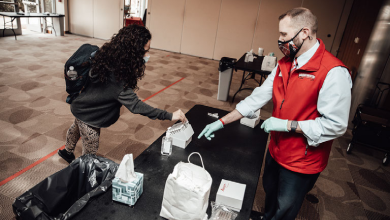
No one wants to get COVID-19, no one wants to give someone COVID-19. People shouldn’t feel a stigma or flog the person who tests positive. You should not feel shame.
Now that more vaccines are being administered, it feels like the pandemic’s finish line is near, however, experts say we aren’t out of the woods just yet.
“I keep comparing it to traffic accidents,” said Bridgewater State University Wellness Center Executive Director Christopher Frazer. “Most happen within two miles of the home because you are less likely to be focused,” he said. “You’re on cruise control. But that’s when bad things happen.”
With things opening back up and people relaxing because of the vaccine rollout, a nation-wide resurgence in COVID-19 cases is occurring.
“We are not going to reach vaccination saturation for a while. The majority of people, including most of our campus population, aren’t being vaccinated fully and receiving the effective range of the dose until the end of May, beginning of June,” Frazer said. “And that’s best-case scenario.”
Which is why it’s important the BSU community stays on track and continues following the appropriate guidelines, he said.
To clear up some misconceptions surrounding COVID-19, Frazer offers the following:
“I don’t need to quarantine if I’m asymptomatic”
Even if you present no obvious symptoms, if you’ve been directly exposed to someone who has tested positive, you still need to quarantine.
“The incubation period is really misunderstood,” Frazer said. COVID-19 has a 14-day incubation period, he explained.
For example, student may be tested five days post exposure and receive a negative result. Thinking they don’t have COVID-19, they go about life as normal. Eight days post exposure, that student still feels fine and attends class, unknowingly exposing others. On day 10 post exposure, the student becomes symptomatic and gets re-tested. This time the results are positive.
“We really want people to understand that if you are someone that tests positive today, tracing goes back 48 hours. If anyone was around you during that time, it’s possible they will have to quarantine and may develop COVID-19,” Frazer said.
“if I share who I’ve been in contact with they will be angry at me.”
Sometimes students who test positive are hesitant to share the names of those they have been in contact with the previous 48 hours. They may fear their peers will become upset, as they too will have to quarantine.
“No one wants to get COVID-19, no one wants to give someone COVID-19. People shouldn’t feel a stigma or flog the person who tests positive. You should not feel shame,” Frazer said.
“I’m fine if I wear a mask and am in contact with someone who is positive.”
Wearing a mask helps prevent the spread of the virus but does not provide 100-percent protection if exposed to a friend who tests positive.
“Masks are still important but won’t prevent you from the need to quarantine if you’ve been within six feet of someone who tests positive,” Frazer said. “For example, if you’ve gotten a car ride from someone (who tests positive) you’re considered a close contact.”
“I just got tested, so I can go about my business before I get my results.”
Once you get tested you shouldn’t go to work, class, or resume normal activities until the results come back.
“Tests don’t mean much without results,” Frazer said.
“I’m not that sick, it’s just allergies, I don’t need to get tested.”
If you are feeling sick, stay away from others and get tested as soon as possible. Don’t assume it’s only allergies or a cold, don’t try to justify it and continue on with your normal activities.
“Don’t risk it, don’t take that chance,” Frazer said. “If you are part of our campus community, you have access to testing. It’s free, easy and quick. Be sensible, don’t postpone it. If you’re feeling sick, get tested.”
Visit bridgew.edu/covid19 to learn more about the BSU COVID-19 testing process and contact tracing protocols.
Do you have a BSU story you'd like to share? Email stories@bridgew.edu